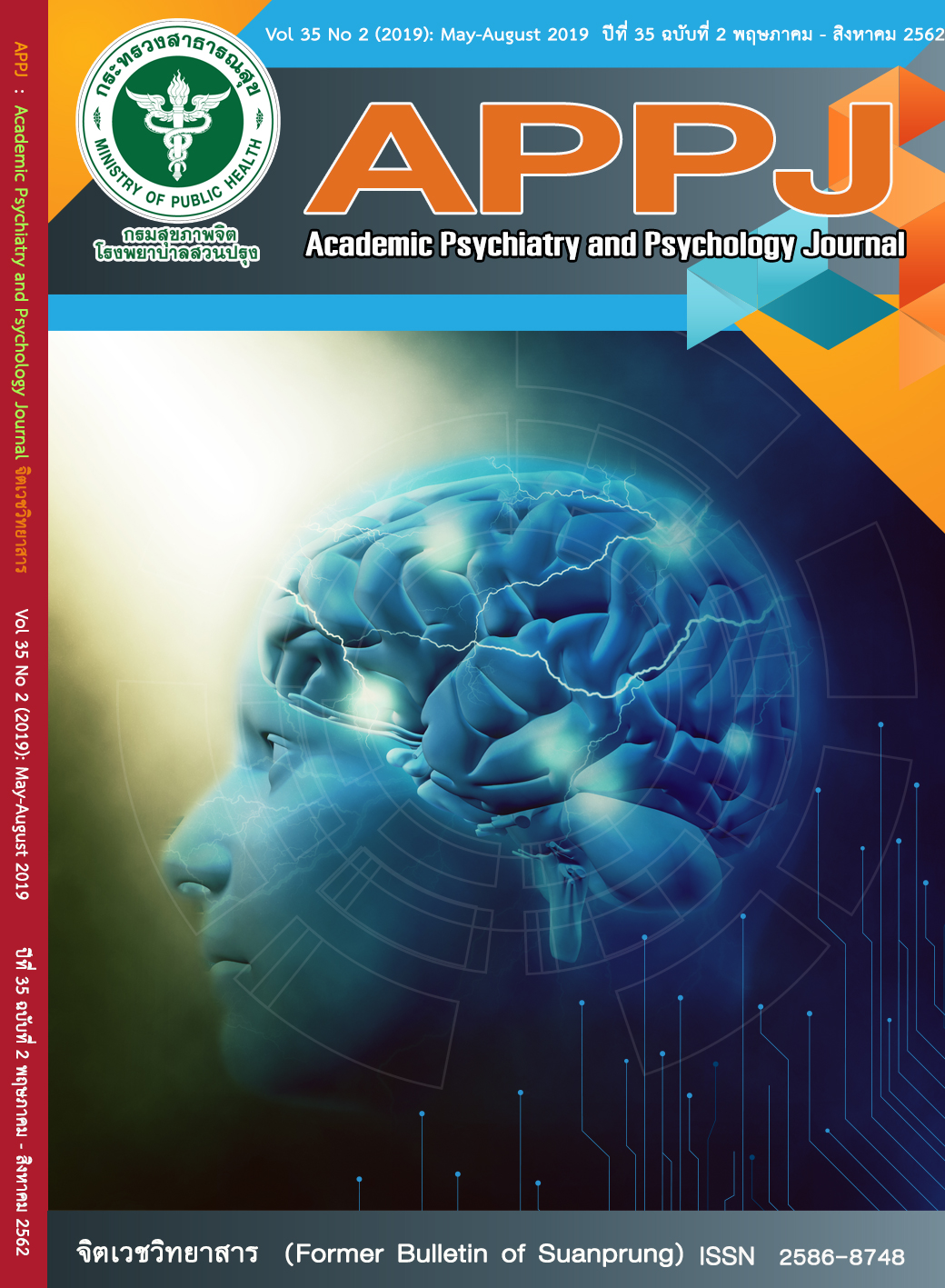The Prevalence and Factors Associated with Stress in Caregivers of Children with Attention-Deficit Hyperactivity Disorder (ADHD)
Main Article Content
Abstract
Objectives: To assess the prevalence of stress in caregivers of children with ADHD and to explore the factors affecting stress in these caregivers.
Method: A cross-sectional study was conducted with caregivers of 113 ADHD children who visited OPD Child and Adolescent Psychiatry, MaharajNakorn Chiang Mai Hospital between October 2017 and March 2018. The questionnaire included: demographic data of caregivers, their children and families; the Suanprung Stress Test (SPST-20); the Chulalongkorn family inventory (CFI) and the SNAP-IV Thai version (Short Form). The percentage was used to represent the prevalence of stress in caregivers of children with ADHD. Descriptive statistics and logistic regression were used to examine the association between factors and caregivers’stress.
Result: Thefindings revealed that 29 caregivershad stress. Factors relating to caregiver stress were the child’s severe symptoms of inattention (aOR 30.27, p=0.001, 95%CI=3.70-247.62) ADHDin girls (aOR=7.10, p=0.005, 95%CI=1.83-27.56)and the absence ofother underlying diseases in children with ADHD (aOR=3.53, p=0.034, 95%CI=1.10-11.35).
Conclusion: The prevalence of stress in caregivers of children with ADHD in this study was 25%. The factors mostly associated with caregiver stress were inattentive ADHD, girl with ADHD, and the absence ofother underlying diseases. Prevention and routine screening should be considered as well as early intervention in caregiver stress.
Keywords: Prevalence, Factor, Caregiver, Stress, ADHD
Article Details

This work is licensed under a Creative Commons Attribution-NonCommercial-NoDerivatives 4.0 International License.
บทความหลังผ่านการปรับแก้จากกองบรรณาธิการแล้ว เป็นลิขสิทธ์ของวารสารจิตเวชวิทยาสาร โรงพยาบาลสวนปรุง กรมสุขภาพจิต กระทรวงสาธารณสุข ห้ามเผยแพร่เพื่อประโยชน์ทางการค้าโดยไม่ได้รับอนุญาต แต่อนุญาตให้เผยแพร่บทความดังกล่าวเพื่อประโยชน์ทางการศึกษาแก่ประชาชนทั่วไป ทั้งนี้กองบรรณาธิการไม่จำเป็นต้องเห็นด้วยกับบทความหรือข้อคิดเห็นใดๆ ที่ปรากฏในวารสารสวนปรุง
References
Visser S, Danielson M, Bitsko RH, Holbrook JR, Kogan MD, Ghandour RM, et al. Trends in the parent-report of health care provider-diagnosed and medicated attention-deficit/hyperactivity disorder: United States, 2003-2011. J Am Acad Child Adolesc Psychiatry 2014;53:34-46.e2. PMID: 24342384.
Centers for Disease Control and Prevention (CDC). Increasing prevalence of parent-reported attention-deficit/hyperactivity disorder among children---United States, 2003 and 2007. MMWR Morb Mortal Wkly Rep 2010;59:1439-43. PMID: 21063274.
Visser SN, Blumberg SJ, Danielson ML, Bitsko RH, Kogan MD. State-based and demographic variation in parent-reported medication rates for attention-deficit/ hyperactivity disorder, 2007-2008. Prev Chronic Dis 2013;10:E09. PMID: 23347704.
Visanuyothin T, Pavasuthipaisit C, Wachiradilok P, Arunruang P, Buranasuksakul T. The prevalence of attention deficit/hyperactivity disorder in Thailand. J Ment Health Thai 2013;21:66-75. (in Thai)
The Royal College of Pediatricians of Thailand, Child and Adolescent Psychiatric Society of Thailand. Clinical practice guideline for children with attention-deficit/hyperactivity disorder. Bangkok: The Royal College of Pediatricians of Thailand; 2010. (in Thai)
Hongsanguansri S, Kiatrungrit K. Attention-deficit/hyperactivity disorder. In: Lotrakul M, Sukanich P. Ramathibodi psychiatry. 4thed. Bangkok: Department of Psychiatry, Faculty of Medicine Ramathibodi Hospital, Mahidol University; 2015. p. 541-52. (in Thai)
Harpin VA. The effect of ADHD on the life of an individual, their family, and community from preschool to adult life. Arch Dis Child 2005;90(Suppl1):i2-7. PMID: 15665153.
Johnston C, Mash EJ. Families of children with attention-deficit/hyperactivity disorder: review and recommendations for future research. Clin Child Fam Psychol Rev 2001;4:183-207. PMID: 11783738.
Yousefia S, Far AS, Abdolahian E. Parenting stress and parenting styles in mothers of ADHD with mothers of normal children. Procedia Soc Behav Sci [Internet]. 2011 [cited 2018 Aug 14];30:1666-71. Available from: https://doi.org/10.1016/j.sbspro.2011.10.323
Anastopoulos AD, Guevremont DC, Shelton TL, DuPaul GJ. Parenting stress among families of children with attention deficit hyperactivity disorder. J Abnorm Child Psychol 1992;20:503-20. PMID: 1487593.
Klongdee K, Nintachan P, Sangon S. Factors related to parenting stress in caregivers of children with attention-deficit/hyperactivity disorder. JPNMH 2016;30:52-68. (in Thai)
Siripongpan A, Putthisri S. Factors affecting mental health of mothers of patients with Attention-Deficit Hyperactive Disorder (ADHD). J Psychiatr Assoc Thailand 2016;61:205-16. (in Thai)
Wayne WD. Biostatistics: a foundation of analysis in the health sciences. 6th ed. New York: John Wiley & Sonsc; 1995.
Ngamjarus C, Chongsuvivatwong V. N4 Studies: sample size and power calculations for iOS [Dissertation]. Songkla: Songkla University; 2014.
Mahatnirunkul S, Pumpaisalchai W, Tapanya P. Suanprung stress test. Bulletin of Suanprung 1997;13:1-20. (in Thai)
Trankasombat U. Family therapy and family counseling. Bangkok: Fueang Fa Printing House; 1997. (in Thai)
Pityaratstian N, Booranasuksakul T, Juengsiragulwit D, Benyakorn S. ADHD screening properties of the Thai version of Swanson, Nolan, and Pelham IV scale (SNAP-IV) and Strengths and Difficulties Questionnaire (SDQ). J Psychiatr Assoc Thailand 2014;59:97-110. (in Thai)
Kirkwood BR, Sterne JAC. Essential medical statistics. 2nd ed. Malden, Massachusetts: Blackwell Science; 2003.
McShane BB, Gal D. Statistical significance and the dichotomization of evidence. J Am Stat Assoc [Internet]. 2017 [cited 2018 Jun 7];112:885-95. Available from: https://doi.org/10.1080/01621459.2017.1289846
Fisher RA. Statistical tests of agreement between observation and hypothesis. Economica [Internet]. 1923 [cited 2018 Jul 11]:139-47. Available from: https://doi.org/10.2307/2548482
Fisher RA. Theory of statistical estimation. Math Proc Cambridge Philos Soc 1925;22: 700-25. doi:10.1017/S0305004100009580.
Rockhill C, Violette H, Vander Stoep A, Grover S, Myers K. Caregivers' distress: youth with attention-deficit/hyperactivitydisorder and comorbid disorders assessed via telemental health. J Child Adolesc Psychopharmacol 2013;23:379-85. PMID: 23952184.
Theule J, Wiener J, Tannock R, Jenkins JM. Parenting stress in families of children with ADHD a meta-analysis. J Emot Behav Disord 2013;21:3-17. doi:10.1177/1063426610387433.
Podolski CL, Nigg JT. Parent stress and coping in relation to child ADHD severity and associated child disruptive behavior problems. J Clin Child Psychol 2001;30:503-13. PMID: 11708238.
Gerain P, Zech E. Does informal caregiving lead to parental burnout? comparing parents having (or not) children with mental and physical issues. Front Psychol 2018;9:884. PMID: 29928242.
Fridman M, Banaschewski T, Sikirica V, Quintero J, Erder MH, Chen KS. Factors associated with caregiver burden among pharmacotherapy-treated children/adolescents with ADHD in the caregiver perspective on pediatric ADHD survey in Europe. Neuropsychiatr Dis Treat 2017;13:373-86. PMID: 28223810.
Psychogiou L, Moberly NJ, Parry E, Nath S, Kallitsoglou A, Russell G. Parental depressive symptoms, children's emotional and behavioural problems, and parents' expressed emotion-Critical and positive comments. PLoS One 2017;12:e0183546.
PMID: 29045440.

